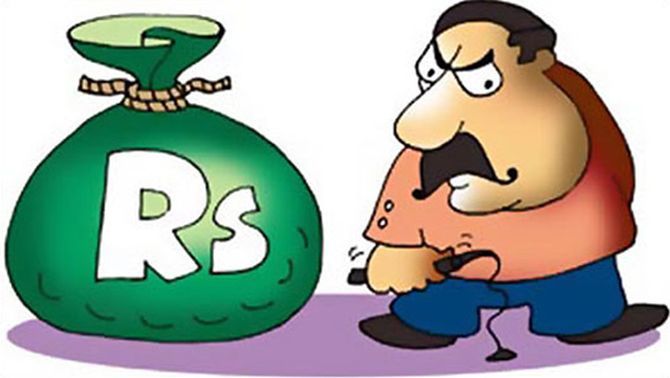Why do we need a cure here for peculiarly Western diseases when we don’t have those diseases, and which the West itself is not trying to cure, asks Debashis Basu.
Illustration: Uttam Ghosh/Rediff.com

The Indian justice system offers us a steady source of bizarre solutions.
But we haven’t yet come across a judge telling the creditor of a failed insurance company: “Forget your money. Here, take some shares of the insurance company in exchange.”
Or to a depositor of a bank that has gone belly up: “Forget your life savings in the bank that you had trusted for several decades. Here, take a few shares of the bankrupt bank instead. You will make money if the shares eventually go up.”
But this is exactly what the justice system will deliver because this is what is enshrined in a whole new Bill that is about become a new law. Welcome to the Financial Resolution and Deposit Insurance Bill (FRDI).
It is not often that you find a country drawing up a whole new law on how to deal with the tsunami that will occur once in a century and that too in other countries.
But India has done exactly this with the FRDI. It prepares us for a situation that the US and Europe faced in 2008, when their stock market crashed and some banks and insurance companies went bankrupt.
To deal with the crisis and contain the contagion, Europe and the US had to take drastic, ad hoc and unprecedented steps, which included takeovers, blanket guarantees, liquidity infusion, and expanded deposit insurance for private banks and insurers.
The 2008 resolution process imposed “very large increases in exposures for the public sector, equivalent to about one quarter of world GDP, and distorted financial markets” in the words of the Working Group on Resolution Regime for Financial Institutions (of the Reserve Bank of India), which did the groundwork for the FRDI Bill.
Huge state bailouts were not the answer to deal with such rare crises, especially since global financial institutions are now massive in size, run complex business lines, and have a cross-border presence that threatens the stability of multiple countries at the same time.
The solution: “Protection of taxpayers from exposure to losses and containing the negative externalities posed by too-big-to-fail (TBTF) institutions,” says the Working Group.
In other words, find someone new to pay for the rampant speculation by investors, bankers and market intermediaries and the poor oversight of regulators.
To achieve this, the Financial Stability Board (FSB), a global body, adopted the ‘Key Attributes’, which were endorsed by the G20 countries.
The FSB was established after the G20 London summit in April 2009. Apparently, India, as part of the G20, is obliged to tick the boxes of 12 “Key Attributes”.
At this stage, anyone will ask the following questions:
What has all this got to do with us? Except one Indian mutual fund that was smoothly taken over by another and a stock market crash that affected a tiny segment of the population, the Indian financial sector hardly faced much stress in 2008.
For the West, the stress was acute in areas where there was a huge concentration of banking assets among a few top banks. In the United Kingdom the combined assets of the top five banks represented 446 per cent of gross domestic product.
We don’t have such concentration. Neither is India exposed to any cross-border risks from global TBTF (too big to fail) institutions.
Besides, the West itself has done nothing to break up such large concentrated banks, identified to be the main culprits of 2008.
So, why do we need a cure here for peculiarly Western diseases when we don’t have those diseases, and which the West itself is not trying to cure?
Anyway, common sense tells us that prevention is far better than cure. And one way to prevent is to purge and punish irresponsible financial market players and regulators.
But the simple fact is that just one banker was jailed for a relatively minor offence, even in the US.
Everyone got away scot-free. Not only that, US banks are back to selling the same toxic products that caused the 2008 crisis.
There was enough warning of an impending financial tsunami in 2007-08 - articles, speeches, public discussions, and even direct communication to the financial regulators and senior politicians.
A decade before the Madoff scandal became public, a number of people knew and spoke about it.
The US market regulator didn’t care. Dr Michael Burry, running a small hedge fund Scion Capital, had bet $1.6 billion on the subprime mortgages.
After the 2008 crash vindicated him, he offered to explain to the regulators how he concluded that housing was a bubble, which will go bust soon.
Nobody was interested. But then no regulator is ever held responsible.
The FRDI wants to grab the money of creditors and depositors above a limit, when banks or insurers are caught in a financial tsunami, for no fault of theirs.
Repeatedly, the fault lies with financial sector regulators and the rating agencies, who fail to act responsibly even when warned of a financial tsunami.
It would only be logical that they would be asked to bail in first with their provident fund money instead of depositors’ and creditors’.
But the FRDI Bill or any other law completely absolves them. It is an irrelevant, misconceived, and unfair Bill. It must be junked.
Debashis Basu is the editor of www.moneylife.in












 © 2025
© 2025